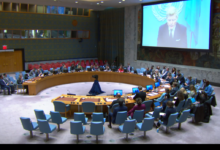President Al-Zubaidi: The government has become inactive, disabled while the people are struggling. We feel the need for a change because this government is helpless and incapable of providing basic services

SMA NEWS – LONDON
President Aidarous Qassem Al-Zubaidi, President of the Southern Transitional Council (STC) and Vice chairman of the Presidential Leadership Council (PLC) told the National News: “The government has become inactive, disabled while the people are struggling. We feel the need for a change because this government is helpless and incapable of providing basic services,” adding, ““The partnership between the north and south is inequitable and unfair as we see it. The majority of southern governorates are liberated and should have a larger representation.”
Here under is the full article:
Yemen’s STC chief calls for revived international interest in peace process
Maj Gen Aidarous Al Zubaidi spoke during visit to London as humanitarian situation worsensززز
The leader of Yemen’s Southern Transitional Council has called on the UK and international community to renew their interest in the country’s declining economic and humanitarian situation in hopes they can come together to support a peace deal.
Maj Gen Aidarous Al Zubaidi, President of the STC, told reporters that the UK could “play a role” in a peace process that would highlight all of Yemen’s issues.
“The UK has played a role in Yemen for a long time. It’s an opportunity for the UK to bring attention back to Yemen on the international stage,” he said.
“They can help in encouraging the peace process to be comprehensive and go beyond a narrative of the conflict that has existed for a long time, which is just about the Houthis and their coup. It’s more than that.”
Gen Al Zubaidi described the dire humanitarian situation in Yemen that has been compounded by an economic crisis and the reduction of international aid due to the war in Ukraine.
“The world is not paying much attention to Yemen, and this has affected the humanitarian situation. We expect this to worsen,” he said.
The devaluation of Yemen’s currency has hit people hard and electricity shortages – with supplies limited to eight hours a day – have been acutely felt as temperatures reach 40°C.
“People are really suffering and this will have bad consequences,” he said, claiming that the government had only a short period of time to solve the problems.
He blamed the shortages on Houthi drone attacks on oil-export hub Al Dhabba port in Hadramawt in November and the reopening of the rebel-controlled Hodeidah port in February.
“It has affected the port of Aden and the other areas. The Houthis are forcing everyone to get anything just through the Hodeidah port, otherwise they won’t accept anything,” Gen Al Zubaidi said.
Ukraine once supplied Yemen with 40 per cent of its wheat, and the country has struggled to find alternative suppliers as war rages there as well.
“After the start of the war in Ukraine, the Indians helped us and covered that deficiency, but we are in a fragile situation, and anything might happen,” he said.
The general’s visit to the UK comes as experts highlighted the weakened role of the international community in Yemen.
“Yemenis see people shuttling back and forth from embassies but with no changes on the ground,” said Jamila Al Rajaa, a Yemeni diplomat, said at an event in Chatham House on Thursday. “It feels like lip service.”
Fighting ceased in Yemen after a UN-brokered truce in April last year, but this truce, which expired in October, is fragile.
“It is de facto, not official, and war might come at any time,” Gen Al Zubaidi said.
Sanaa Centre research director Yasmeen Al Eryani added: “The UN’s role is critical to ensure that the peace process is inclusive and sustainable.”
Gen Al Zubaidi said the government – of which the STC is part – has been ineffective in addressing the crises.
“The government has become inactive, disabled while the people are struggling. We feel the need for a change because this government is helpless and incapable of providing basic services,” he said.
“The partnership between the north and south is inequitable and unfair as we see it. The majority of southern governorates are liberated and should have a larger representation.”
Despite these frustrations, he told reporters the STC would continue working with the government.
“It’s about solving the problem because we don’t have time, we have just months to solve these problems,” he said.
The general also voiced support for the UN-led peace process that covered questions over independence for Yemen’s south, for which he committed to holding a referendum, he said at the Chatham House event.
Saudi Arabia engaged in direct peace talks with Houthis in March, which resulted in the exchange of 900 prisoners and official Saudi delegations travelling to Sanaa.
While he described the restoring of ties between Saudi Arabia and Iran as “good for the region”, he called for greater inclusivity in the peace talks with the Houthis, which did not involve the Presidential Leadership Council or regional allies.
“The Saudis are serious [about peace.] They want to leave and close this file and focus on Vision 2030,” he said, referring to he kingdom’s development and transformation agenda.
Gen Al Zubaidi said the threat of terrorism in Yemen remained significant.
“Terrorism is supported by different factions. The Houthis found a way of using these terrorist groups to destabilise liberated areas,” he said.
In spite of the progress made towards a lasting solution, from the meetings so far, Gen Al Zubaidi was sceptical of the Houthis’ commitment to the peace negotiations.
“They are not serious about them,” he said. “They are just buying time to reinforce themselves.
“They live and survive on war, not peace.”







